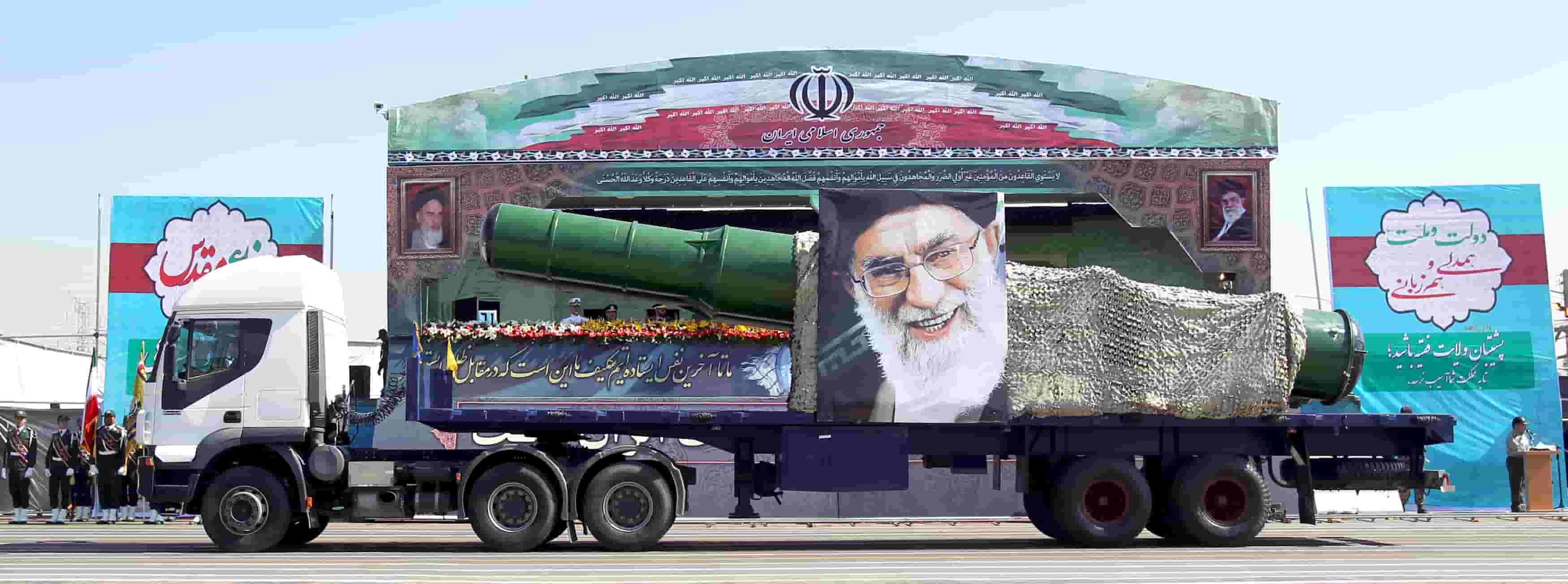Iran is « state sponsor of terrorism, » 11 Arab countries tell UN

A military truck carrying a missile and a picture of Iran’s Supreme Leader Ayatollah Ali Khamenei.
UN Watch welcomed a letter by 11 Arab countries to the UN which accuses Iran of being « a State sponsor of terrorism » throughout the entire Middle East, and of only increasing « aggression in the region and the continuation of support for terrorist groups » since the signing of the nuclear deal. See full text below.
The letter, published on Friday by the UN, was signed by the UN ambassadors of Bahrain, Egypt, Jordan, Kuwait, Morocco, Oman, Qatar, Saudi Arabia, Sudan, United Arab Emirates and Yemen.
The Arab countries expressed alarm that the Iranian constitution « through its political and religious figures, calls for the export of its revolution to other countries. »
Specifcially, they accused Iran of sponsoring terrorism spans « from Hizbullah in Lebanon and Syria, to Houthis in Yemen and terrorist groups and cells in the Kingdom of Bahrain, Iraq, the Kingdom of Saudi Arabia, Kuwait and elsewhere. »
The letter accused Iran of a « radical approach » that « undermines security and stability in our region and the Arab world. »
Human rights activists said it was important that Middle Eastern actors were speaking out against Iranian terrorism, especially on the eve of the UN’s vote on a resolution condemning Iran for widespread human rights abuses.
« Iran likes to dismiss all criticism of its human rights violations and brutality at home and abroad as part of a western plot, but that’s hard to sustain when the accusers are all Muslim governments, including recent allies of Iran like Sudan, » said Hillel Neuer, executive director of UN Watch, a Geneva-based non-governmental human rights organization.
_________
Note verbale dated 27 October 2016 from the Permanent Mission of the United Arab Emirates to the United Nations addressed to the Secretary General
The Permanent Mission of the United Arab Emirates presents its compliments to the Secretary-General of the United Nations and has the honour to refer to the attached letter addressed to the President of the General Assembly signed by the Permanent Representatives of the Kingdom of Bahrain, the Arab Republic of Egypt, the Hashemite Kingdom of Jordan, the State of Kuwait, the Kingdom of Morocco, the Sultanate of Oman, the State of Qatar, the Kingdom of Saudi Arabia, the Republic of the Sudan, the United Arab Emirates and the Republic of Yemen (see annex).
The Permanent Mission of the United Arab Emirates would be grateful if the present note verbale and its annex could be circulated as a document of the General Assembly, under agenda item 8.
Annex to the note verbale dated 27 October 2016 from the Permanent Mission of the United Arab Emirates to the United Nations addressed to the Secretary-General
18 October 2016
On behalf of our respective Governments, we have the honour to write to you with reference to the right of reply made by a representative of the Islamic Republic of Iran at the conclusion of the general debate of the seventy-first session of the General Assembly of the United Nations, on 26 September 2016, in which a series of unfounded claims were made. In this regard, we have the honour to convey to you the following:
It is with a deep sense of frustration that we note that the Islamic Republic of Iran, with its expansionist regional policies, flagrant violations of the principle of sovereignty and constant interference in the internal affairs of Arab States, continues to play a negative role in causing tension and instability in our region.
We express concerted alarm at the Constitution of the Islamic Republic of Iran, which, through its political and religious figures, calls for the export of its revolution to other countries. We stress that the Islamic Republic of Iran is a State sponsor of terrorism in our region, from Hizbullah in Lebanon and Syria, to Houthis in Yemen and terrorist groups and cells in the Kingdom of Bahrain, Iraq, the Kingdom of Saudi Arabia, Kuwait and elsewhere.
With regard to the military campaign of the coalition to restore legitimacy in Yemen referenced by the Iranian representative, we would like to recall that the legitimate Government of Yemen issued a request for assistance in March 2015, including military intervention, to the Cooperation Council for the Arab States of the Gulf and the League of Arab States, to protect Yemen and its people from the continuing aggression of the Iran-backed Houthis. In response to this request, the coalition to restore legitimacy in Yemen was formed, under the leadership of the Kingdom of Saudi Arabia, for the protection of Yemen and its people and to help Yemen to counter terrorism.
This request was issued in full conformity with international law and the right of self-defence as stipulated in Article 51 of the Charter of the United Nations. The United Nations Security Council was duly informed of this request by a letter dated 24 March 2015 from the Permanent Representative of Yemen to the United Nations, and by identical letters dated 26 March 2015 from the Permanent Representative of the State of Qatar (S/2015/217), as noted in the preamble to Security Council resolution 2216 (2015).
Along with the Security Council, the League of Arab States, the Organization of Islamic Cooperation and the Cooperation Council for the Arab States of the Gulf, we condemn in the strongest possible terms the latest Houthi attack in the Strait of Bab al-Mandeb on 1 October on a vessel chartered by the United Arab Emirates, in clear violation of international law. In this regard, in a press statement on Yemen issued on 4 October 2016, the members of the Security Council stated that they took threats to shipping around Bab al-Mandeb, a strategically important shipping passage, extremely seriously and stressed that the continued exercise of freedom of navigation in and around Bab al-Mandeb Strait in accordance with relevant international law must be upheld.
We strongly condemn the active influence of the Islamic Republic of Iran in the conflict. The Islamic Republic of Iran has supported the Houthis in Yemen financially, strategically and militarily, by training Houthi fighters and sending shipments of weapons and ammunitions into the country illegally and in flagrant violation of United Nations Security Council resolutions 2216 (2015) and 2231 (2015). Shipments of illicit weapons sent by the Islamic Republic of Iran have been intercepted on multiple occasions by several Member States and the Combined Maritime Forces, as mentioned in a letter dated 14 September 2016 from the Permanent Representative of Saudi Arabia to the United Nations addressed to the President of the Security Council (S/2016/786).
We reaffirm our support for the important work of the Special Envoy of the Secretary-General for Yemen, Ismail Ould Cheikh Ahmed, to reach a comprehensive agreement to end the conflict in Yemen, in accordance with the initiative of the Gulf Cooperation Council, the outcome of the National Dialogue Conference and its implementation mechanism, and the relevant Security Council resolutions, and we further ask Member States to take note of the joint communiqué on the situation in Yemen issued by the United Kingdom of Great Britain and Northern Ireland, the United States of America, the Kingdom of Saudi Arabia, and the United Arab Emirates on 22 September 2016.
We remain firm in our resolve that any interference by the Islamic Republic of Iran in the domestic affairs of Arab States is unacceptable and must be confronted. In this regard, we reiterate the reference made by the Minister for Foreign Affairs of the Kingdom of Bahrain, Khalid bin Ahmed bin Mohamed al-Khalifa, in his statement to the General Assembly on 26 September 2016, that the only way forward is for the Islamic Republic of Iran to comprehensively change its foreign policies and end hostilities, thus paving the way for the region to enter a new era of stability and development.
We reaffirm our support to the nuclear agreement that was reached between the five plus one group and the Islamic Republic of Iran. The nuclear agreement gave the Islamic Republic of Iran the opportunity, after years of sanctions, to create normal relations with its neighbours and demonstrate a new commitment to regional stability and respect for the sovereignty of other nations. Unfortunately, since the signing of the nuclear deal, we have seen nothing but increased Iranian aggression in the region and the continuation of support for terrorist groups.
In addition, we reaffirm the tireless efforts of the Custodian of the Two Holy Mosques, King Salman bin Abdul Aziz al-Saud of the Kingdom of Saudi Arabia, and the Government and people of the Kingdom, in their role of serving the pilgrims and visitors to the holy sites during their performance of hajj and umrah. We deplore the exploitation of the tragic Mina incident by the Islamic Republic of Iran for political ends and its desperate attempt to cause sectarian strife in the region, in a reprehensible manner.
Furthermore, we reaffirm that the three islands of Greater Tunb, Lesser Tunb and Abu Musa in the Arabian Gulf are an integral part of the territory of the United Arab Emirates. We categorically reject the baseless claims made by the Islamic Republic of Iran that the three United Arab Emirates islands of Greater Tunb, Lesser Tunb and Abu Musa in the Arabian Gulf have and continue to be a part of the territory of the Islamic Republic of Iran. The following facts, which were most recently stated in a letter dated 14 March 2016 from the Permanent Representative of the United Arab Emirates to the United Nations (S/2016/245), serve as a rebuttal to the claims made by the Islamic Republic of Iran:
First, Iranian forces arrived on the island of Abu Musa in the Arabian Gulf for the first time on 30 November 1971. The presence of those forces on the island was sanctioned by the memorandum of understanding regarding Abu Musa that was concluded in November 1971. The provisions of that memorandum of understanding and the map delimited, inter alia, the area of Abu Musa that was to be occupied by those forces; that area conforms to the extent of Iranian jurisdiction on the island. The aforementioned memorandum of understanding is still in force and binding and is the only legal basis for the presence of Iranian forces in the area allocated to them on the island. Any unilateral revocation of that memorandum of understanding shall be null, void and without effect, because it contravenes the rules and principles of international law.
Second, Iranian armed forces occupied the two islands of Greater Tunb and Lesser Tunb in the Arabian Gulf by force on 30 November 1971, in contravention of Article 2, paragraph 4, of the Charter of the United Nations. The illegality of territorial acquisition resulting from the threat or use of force is an established principle of international law. Moreover, in its resolution 2625 (XXV) of 24 October 1970, entitled “Declaration on Principles of International Law concerning Friendly Relations and Cooperation among States in accordance with the Charter of the United Nations”, the General Assembly emphasized that no territorial acquisition resulting from the threat or use of force shall be recognized as legal.
We continue to call upon the Islamic Republic of Iran to return the occupied islands in the Arabian Gulf to their rightful owners, either voluntarily or through peaceful means, particularly through international justice or arbitration, in order to maintain friendly relations and good-neighbourliness in the Arabian Gulf region.
We reaffirm that the stability and economic prosperity in the Arabian Gulf region is founded on the importance of maintaining good-neighbourliness and the principles of sovereignty, independence and non-interference in domestic affairs, in stark contrast with the Islamic Republic of Iran’s radical approach that undermines security and stability in our region and the Arab world.
We would be grateful if the present letter could be circulated to all States Members of the United Nations as a document of the General Assembly, under agenda item 8.
(Signed) Jamal Fares Alrowaiei
Permanent Representative of the Kingdom of Bahrain to the United Nations
(Signed) Amr Abdellatif Aboulatta
Permanent Representative of the Arab Republic of Egypt to the United Nations
(Signed) Sima Sami Bahous
Permanent Representative of the Hashemite Kingdom of Jordan to the United Nations
(Signed) Mansour Ayyad SH A Alotaibi
Permanent Representative of the State of Kuwait to the United Nations
(Signed) Omar Hilale
Permanent Representative of the Kingdom of Morocco to the United Nations
(Signed) Khalifa Ali Issa Al Harthy
Permanent Representative of the Sultanate of Oman to the United Nations
(Signed) Alya Ahmed Saif Al-Thani
Permanent Representative of the State of Qatar to the United Nations
(Signed) Abdallah Y. Al-Mouallimi
Permanent Representative of the Kingdom of Saudi Arabia to the United Nations
(Signed) Omer Dahab Fadl Mohamed
Permanent Representative of the Republic of the Sudan to the United Nations
(Signed) Lana Zaki Nusseibeh
Permanent Representative of the United Arab Emirates to the United Nations
(Signed) Khaled Hussein Mohamed Alyemany
Permanent Representative of the Republic of Yemen to the United Nations












